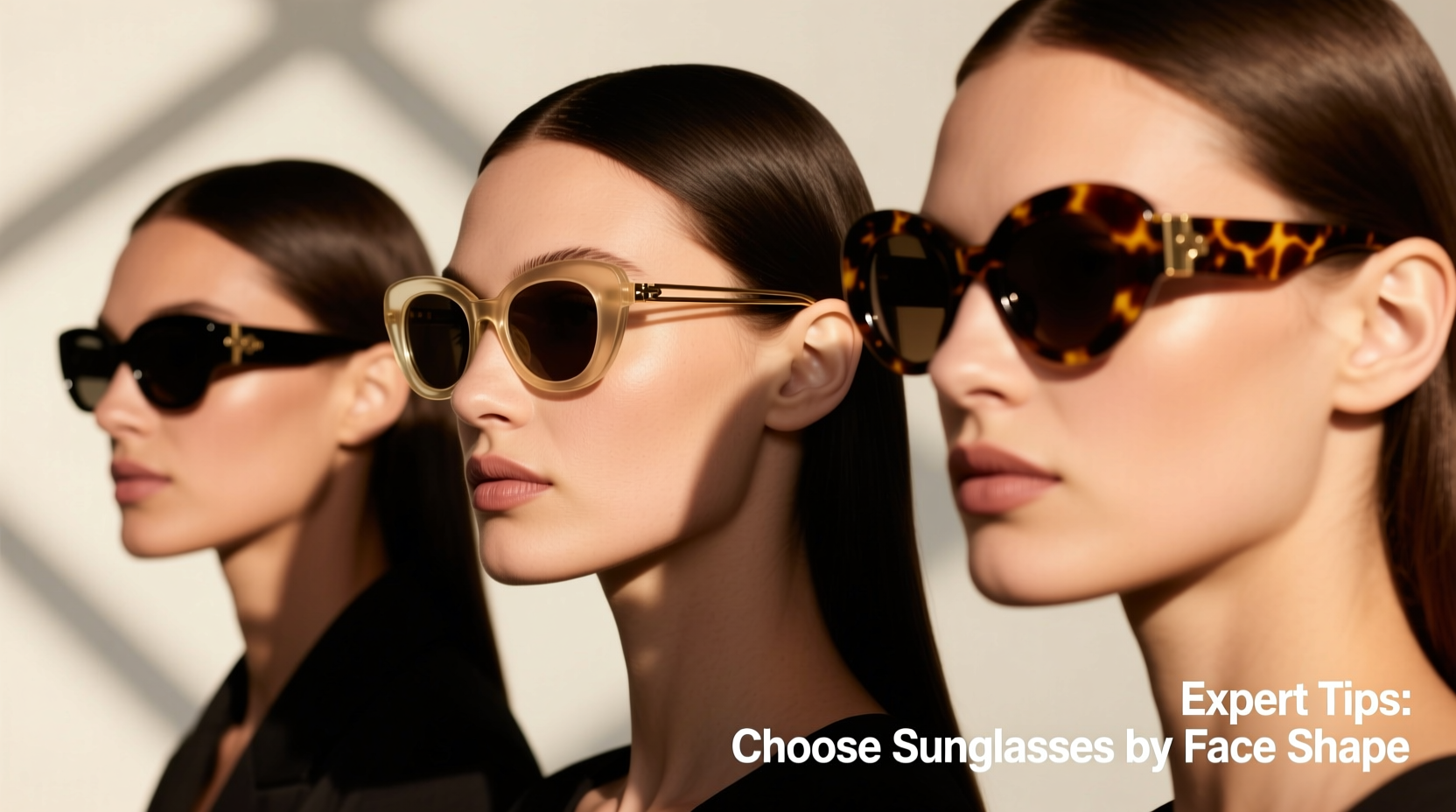Selecting the perfect pair of designer sunglasses goes beyond brand names and price tags. The true mark of a well-chosen pair lies in how they harmonize with your facial structure. A frame that flatters your face shape enhances your features, balances proportions, and elevates your entire look. Yet, many people gravitate toward trends without considering this crucial element, ending up with glasses that don’t quite “work.” Understanding your face shape and how different frames interact with it is the key to making a confident, stylish choice.
Understanding Face Shapes: The Foundation of Frame Selection

Before diving into brands or lens tints, identify your face shape. This simple step transforms sunglass shopping from guesswork into a strategic decision. There are five primary face shapes: oval, round, square, heart, and diamond. Each has distinct characteristics that respond differently to frame styles.
To determine your face shape, stand in front of a mirror and trace the outline of your face with a washable marker or lipstick. Step back and compare the shape to these common types:
- Oval: Forehead slightly wider than the jawline, with soft curves and balanced proportions.
- Round: Width and length nearly equal, with full cheeks and a rounded chin.
- Square: Strong jawline, wide forehead, and angular features with similar width and length.
- Heart: Broad forehead and cheekbones tapering to a narrow chin.
- Diamond: Narrow forehead and jawline with wide cheekbones—the rarest shape.
“Face shape isn’t about changing who you are—it’s about enhancing what already works. The right frames draw attention to your best features.” — Marcus Reed, Eyewear Stylist & Consultant
Matching Sunglasses to Your Face Shape
Once you’ve identified your face shape, use it as a guide to select frames that balance and accentuate your natural geometry. Here’s how each shape benefits from specific frame styles:
Oval Faces: The Most Versatile
If you have an oval face, consider yourself lucky—most frame styles suit you. However, avoid oversized or excessively narrow designs that disrupt your natural symmetry. Opt for structured frames like aviators, rectangular wayfarers, or cat-eye shapes to maintain proportion.
Round Faces: Add Definition
Rounded faces benefit from angular or geometric frames that create contrast. Look for rectangular, square, or shield-style sunglasses to elongate the face and introduce sharp lines. Avoid circular or overly curved frames, which can make the face appear shorter.
Square Faces: Soften the Angles
Strong jawlines and broad foreheads call for frames that soften angular features. Round, oval, or browline styles help balance the face by adding curves where there are edges. Oversized round frames or classic teardrop shapes are excellent choices.
Heart Faces: Balance the Forehead
The goal here is to minimize the forehead width while emphasizing the eyes and cheekbones. Frames that are wider at the bottom—like cat-eye, butterfly, or round-bottomed aviators—create visual balance. Rimless or semi-rimless styles also work well by reducing top-heavy appearance.
Diamond Faces: Highlight Cheekbones
With high cheekbones and a narrow forehead and chin, frames that add width at the top and bottom enhance this unique shape. Oval, rimless, or modified cat-eye frames draw attention to the eyes and balance proportions. Avoid narrow or small frames that get lost in the face.
Key Features That Influence Fit and Flattery
Beyond shape, several design elements affect how sunglasses complement your face. These include frame size, bridge fit, temple length, and color.
| Feature | What to Consider | Best For |
|---|---|---|
| Frame Size | Should not extend beyond the sides of your face; lenses shouldn’t cover eyebrows. | All face shapes |
| Bridge Fit | Nose pads should sit comfortably without pinching or sliding. | Low bridges: keyhole or adjustable pads |
| Temple Arms | Should curve gently behind ears without pressure points. | Longer faces: thicker temples add balance |
| Frame Color | Complement skin tone—neutral tones (black, tortoiseshell) are universally flattering. | Warm tones: gold, cognac; Cool tones: silver, gunmetal |
Step-by-Step Guide to Choosing the Perfect Pair
Follow this practical sequence when shopping for designer sunglasses, whether online or in-store:
- Identify your face shape using the mirror method described earlier.
- Research frame styles known to complement your shape—bookmark examples.
- Try on multiple options in natural light. Move your head side to side to assess balance.
- Check comfort: Frames shouldn’t press on temples or slip down your nose.
- Evaluate proportion: Ensure the frame width matches your face width.
- Assess color harmony with your skin tone and wardrobe.
- Consider lifestyle use: Driving? Sport models with polarized lenses. Fashion focus? Prioritize design and brand craftsmanship.
Real Example: From Frustration to Confidence
Sophia, a marketing executive with a round face, had bought three pairs of trendy round sunglasses in two years, only to feel they made her look “plumper.” During a consultation at a specialty eyewear boutique, she learned her face shape and was guided toward a pair of angular, matte-black rectangular frames with slight upward angles at the outer edges. The difference was immediate. “I finally felt like my glasses weren’t fighting my face,” she said. “They framed my eyes and gave me a sharper look—people even commented on how ‘put together’ I appeared.”
Common Mistakes to Avoid
- Choosing based solely on celebrity influence: What looks great on Rihanna may not suit your bone structure.
- Ignoring scale: Oversized frames can overwhelm smaller faces; tiny frames disappear on larger ones.
- Skipping the try-on: Online shopping is convenient, but virtual try-ons aren’t perfect. When possible, test in person.
- Overlooking lens quality: Designer branding doesn’t guarantee UV protection. Always confirm 100% UVA/UVB blocking.
FAQ
Can I wear round glasses if I have a round face?
You can, but proceed with caution. If you love the style, opt for thin metal frames with subtle angular details to break up the roundness. Avoid thick, fully circular designs that echo your face shape.
Do face shape rules apply to all genders?
Yes. While some styles are marketed as gender-specific, the principles of proportion and balance apply universally. A square face benefits from rounded frames regardless of gender presentation.
What if my face doesn’t fit neatly into one category?
Many people have hybrid shapes—such as oval-square or round-heart. In such cases, prioritize the dominant feature. If your jaw is angular but your face is long, treat it as a square-oval and choose frames that soften angles while maintaining balance.
Final Checklist Before You Buy
- ✅ I know my face shape.
- ✅ The frame complements rather than mirrors my face shape.
- ✅ The width of the frame aligns with my face width.
- ✅ The bridge fits snugly without slipping.
- ✅ The arms don’t pinch or leave marks.
- ✅ The lens color enhances my eye color and suits my daily activities.
- ✅ The sunglasses offer 100% UV protection.
- ✅ I feel confident and comfortable wearing them.
Conclusion: Style Meets Intelligence
Designer sunglasses are more than a fashion statement—they’re a personal accessory that speaks to your taste, lifestyle, and self-awareness. By applying expert knowledge about face shapes and frame dynamics, you transform a simple purchase into a powerful styling tool. The perfect pair doesn’t just protect your eyes; it highlights your best features and boosts your confidence. Don’t settle for trend-driven choices. Invest time in understanding your face, experiment thoughtfully, and choose with intention.









 浙公网安备
33010002000092号
浙公网安备
33010002000092号 浙B2-20120091-4
浙B2-20120091-4
Comments
No comments yet. Why don't you start the discussion?